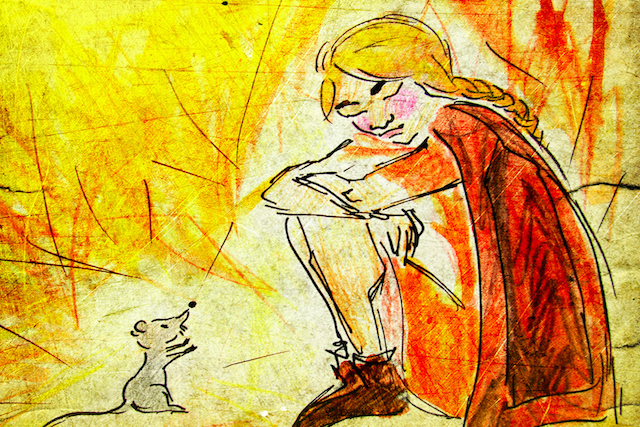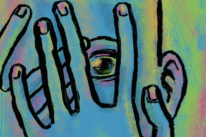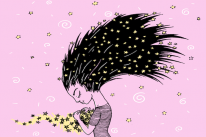
“There is no magic cure, no making it all go away forever. There are only small steps upward; an easier day, an unexpected laugh, a mirror that doesn’t matter anymore.” ~Laurie Halse Anderson
It began in elementary school. I was a chubby immigrant with a thick accent and hand-me-down clothes. I so badly wanted the other kids to like me, and I had no idea why everything I said and did seemed to push them away.
My jokes and comments would trigger awkward silences or ridicule—especially in groups. Those moments were traumatizing, but they were also confusing. How could I make them like me?
As I learned English, I found some company in the schoolyard, but I continued to be bullied for my weight, my clothes, my face that turned red so easily. It didn’t help when I started going through puberty at age nine, younger than every other girl in my class.
In elementary school, I remember walking home one day when two boys followed me, calling out things like “Put on a few pounds this year, haven’t you?” I remember staring at my feet, putting one in front of the other, walking home as fast as I could.
The wounds of being rejected, bullied, and ostracized buried deep. I never felt safe unless I was completely alone.
In high school, I remember walking home once and realizing that a popular guy from a grade above was walking behind me. He didn’t say anything to me, but my heart started beating wildly, and I became hyperaware of my arms swinging back and forth. How awkward were these long appendages coming out of my body! How awkward was I!
Even though I would walk home as fast as I could, I didn’t feel any safer around my family. In my parents’ house, emotional expression wasn’t encouraged or accepted. The only safe place was alone with myself.
But as time went on, the anxiety I felt about other people’s opinions of me crept into my alone time too. I worried. I ruminated. I overanalyzed.
It was difficult to live in fear all the time, so I developed all kinds of ineffective habits that helped me feel in control. I starved myself. I lied. I got addicted to anything I could get my hands on.
I’ve been on a long journey of healing—not only the toxic ways I had learned to avoid feeling discomfort around other people but also the scars that caused that discomfort in the first place. The path has been long and hard. I’m still walking it.
I’ve learned a few things that have been helpful. For example, I’ve learned to find the thoughts that trigger anxiety in social situations and question them. I’ve found the places in my body where I tense up when I think this way, and I’ve learned how to relax them.
I’ve learned that the feeling of rejection won’t kill me (while running from it almost did). I’ve learned to sit with all kinds of uncomfortable emotions without running away.
I’ve learned to reduce my overall anxiety levels with exercise, lower caffeine intake, journaling, mindfulness, and lots of alone time.
I’ve learned that working out before social occasions lowers the chance of being triggered. I’ve learned that allowing some time afterward to replay social situations in my head actually helps—as long as I give myself a time limit and wrap up with some self-loving thoughts when the time is done.
I’ve learned that, sometimes, I should actually take the advice of my self-judgment and change how I talk to people. I’m still learning about which advice to take and which to leave. I’ve learned to be gentle with myself while I figure it out.
When I first went a few months without falling into a deep self-judgment hole, I thought I was cured. I thought I would feel free in social situations forevermore. But life had other plans.
I have learned to think of social anxiety and fear of rejection as allergies. I’m allergic to thoughts like “Do they like me? What should I do to make them like me? What did I say wrong? What should I do so they don’t think I’m weird?” Most of the time, I can avoid falling into old patterns. I hear those thoughts and think, “Nope, I’m allergic to that. That’s not good for me.”
But sometimes, I don’t catch the thoughts until it’s too late. Or I start having them when I’m tired or stressed out. Or I experience a series of rejections and don’t have enough time to process through them before my emotions and thoughts weave into a tight downward spiral.
It happens. It happened last week. It lasted for four days. I’ve learned to forgive myself, be gentle, and know that I’m doing my best.
I have friends with celiac disease who experience side effects for at least a few days when they eat gluten. At that point, the damage has already been done. The only thing they can do is not make it worse. So that’s what I try to do as well.
I try not to judge myself for being stuck in self-judgment for a few days. That makes it easier to deal with. I try to think of it as my mind being swollen and sick. It needs time to heal. It needs love and patience. It doesn’t need more of the thing that made it sick in the first place.
Each time my mind gets swollen with judgment, I have an opportunity to talk to myself with love, patience, and kindness. I also have an opportunity to learn more about myself. I try to extract some wisdom out of each period of suffering.
I used to want to get rid of this for good, but lately, I’m realizing that maybe I never will be. Maybe it really is like an allergy. No matter how well I can learn to avoid the things that make me feel horrible, they will always be bad for me.
Although these episodes are still unpleasant, I no longer feel helpless when they come. I’ve been practicing. I feel a sense of accomplishment each time I can navigate through periods of self-doubt with self-love and honesty.
I can’t control what makes me sick, but I can be a kind, loving nurse to myself when I get that way. And that gives me some sense of control over the situation.
I couldn’t control what happened in the past. And I’ve realized I can’t control my triggers in the present. But I can control how I respond to those triggers. And if I fail to respond differently, then I can control how I respond to that failure.
However small, there is always room for a choice. And instead of focusing on what I can’t do, I’m trying to focus on what I can.
It’s a hard road. If you’re in the middle of a similar journey, I hope you’ll cut yourself some slack and give yourself some credit for how far you’ve come. You’re doing the best you can, and that’s more than enough.
About Vironika Tugaleva
Vironika Tugaleva (also known as Vironika Wilde) is a poet, spoken word artist, activist, and award-winning author. Vironika believes in the medicinal power of honest words and tough truths. When Vironika isn't writing, she loves stargazing, singing, and eating pickles (sometimes, all at once). You’re welcome to follow her on Instagram (@vironikawilde), check out her latest book, Love & Gaslight, or get a free preview of The Art of Talking to Yourself.
- Web |
- More Posts













 Though I run this site, it is not mine. It's ours. It's not about me. It's about us. Your stories and your wisdom are just as meaningful as mine.
Though I run this site, it is not mine. It's ours. It's not about me. It's about us. Your stories and your wisdom are just as meaningful as mine.
Thanks for the relatable article. Much love!
That was really lovely. Thank you for sharing your personal story – that was really brave. I’m sorry American kids can be so nasty about immigrants – we have a lot to change here culturally. I also got made fun of a lot in school and I’m sure it still affects me sometimes today, so I can relate. There were great tips in there, too, for catching it and being kind to yourself when you don’t catch it. Thanks again for this article ❤️
Thanks for reading! Funny enough, this all happened not only in Canada but in Toronto: the most multi-cultural city in the world. I remember, on my first day in grade 3, hearing someone groan and say, “Ugh, not another immigrant!” There were a lot of us, but that didn’t make it easier. I wonder if it’s different now. I heard that, at this point, every culture is a minority in Toronto. I think it’s just a matter of time before everyone starts accepting everyone. At least, I hope!
Mindfulness meditation is a great vehicle to heal emotional pain and suffering. We learn to meditate on our emotions directly and embrace them with conscious awareness and love. This combination is what makes mindfulness so powerful. At the root of rejection and hurt is fear. What heals fear is conscious awareness and love.
I agree with you that conscious awareness is a healing thing. Though I wouldn’t agree that it needs to take the shape of mindfulness meditation for everyone. Human beings are diverse creatures. There are many ways to be aware 😊
Beautifully written article. Thank you for sharing, you are an inspiration. Continue to live well and love yourself.
Thank you! And you as well ❤️
What an incredible article. I too have experienced those very insecurites, especially after certain events (parties, etc..) even though everyone thinks I’m very confident. I’m just good at faking it! A random comment can send me on a shame spiral. I have swung between either complete denial/pretending these feelings are not happening or over analysing, scritinizing and ruminating which can sometimes send me down a rabbit hole. For days. Even years later certain shame memories can be triggered. Finding the middle ground can be tricky. Knowing what is simply being too hard on oneself or whether there are grounds for self criticism is another. Self compassion is something I am consciously working on, whilst embracing my ‘weirdness’ and quirkiness. But it’s a lifelong project. I’m over 50 now and will probably still be working on this for the rest of my life. A great book I can recommend is ‘Healing the shame that binds you’ by John Bradshaw. I had quite a few ‘aha’ moments reading that, as to what triggers feelings of shame, rejection or self criticism. Thank you for this honest, beautifully written post.
I’m glad you enjoyed this post! All the best on your journey of self-discovery.
I would have been happy to have you as a friend. “Americans” are people, and they are good, kind, just, faithful, wise, gregarious, honorable, free-hearted, loving, loyal, strong, diligent workers, etc., such that of people in other lands near and far. I have travelled near and far, and have seen the best and the worst in them, to include myself. Make no mistake, people will always be- however and whatever they choose in moments, hours and seconds to be. Who are you? That is what matters.
Absolutely. I agree with you. People are all different. Travelling has taught me the same thing. I think what’s really important is, as you say, knowing oneself, and also finding others who share our values. I’ve discovered that being a truth seeker is important to me, and I find those kinds of people all over the world.
I can relate so much to your description of social anxiety It’s almost like I penned that text myself. I also went through a lot and have my share of accumulated scars. Nonetheless, I think all those things I sometimes wish weren’t there made me a better person. Somehow, being forced to learn positive ways to deal with all those negative aspects of your life makes you more human. I still have a lot to learn, every day, but that’s ok. It’s a task I’m willing to undertake.
🙂 I feel so identified.
What a lovely article to read that has really touched my heart from the depths of its soul. And no, I’m not over-exaggerating.
I empathize with you as well – because I, too, have the same problem. Know that you’re not alone though; even though we might have existing wounds of rejection that sting especially when they are recurring, everyone struggles with it. Some people deal with it better than others do, but ultimately everyone is different and just because some people are good in that doesn’t mean we are naturally good in it too.
Like you, I had a history of being verbally abused by my peers in school, and that has greatly impacted the way I perceived myself. I started to think that I was less than others, and I would envy others a lot.
However, as I grown up, I realized that I should not let the things that used to haunt me when I was younger haunt me now. I was wrong to have thought that I was not as important as others, just because of what they say. What they say is not important. What I feel about myself is. And I don’t need the love or recognition of another people for me to respect and honor myself. I am more than what they think of me. I have now gradually learnt to accept myself, and I try to spread positivity now as well, instead of spreading negativity like the people who used to insult me did.
They were horrible people, and we don’t need more terrible people in this world. Hence, I am proud to say that I’ve slowly grown. I wish you the same path of healing as well. All the best. You’re a marvelous human being to have written this article!
Love,
Anna
Thank you for your beautiful words Vironika. As someone who struggles with self-doubt, I find your article reassuring as it is very real, realistic and somehow still very hopeful. I’ve also taken a quick look at your book (The Art of Talking to Yourself – another book I need to grab) and I really like the idea of talking to myself, but in a compassionate way. I’m actually trying to make a regular habit of talking with myself, and really listening deeply beneath all the layers of doubt, awkwardness and anxiety. Sometimes it really brings a change in me, and other times I struggle to even interact with myself. The part where you wrote “I’m still walking it” is particularly encouraging for me. Thank you once again. Eric
What an inspirational article, I feel blessed to have found this at this time which assures me that I am not alone, I am not weird, my interests are different and there are other people where I can find my type.
Yes I am immigrant too to this country, but me unable to fit in not because of that reason. I am survivor of abusive marriage for more than a decade. I lost my total self in that process. It’s been close to 5 years now that I am standing on my feet, it’s like another birth living in the same body now. I am so proud of my self and so grateful to God for making me the person I am today. But inside me I still have the person who was neglected, humiliated, abused, experienced that everything I do is wrong, I am not worth receiving love and I wish I become so small that I become invisible when i am in social situations. Not necessarily big social gatherings. It’s like when I am in a group of 2 or more at work and talking to single person also sometimes. I can sense they feel I so weird, I don’t want to blame them, I feel I know I am unable to fit in. I don’t know fun way to respond to defend when they make fun of me.
Thank you for the hugs and kind words! Yes, I think the route is difficult but irreplaceable. I used to wish for a different life, but without these experiences, I wouldn’t be doing what I’m doing now. I wouldn’t be who I am. So it’s all part of the journey ❤️
Yes ❤️